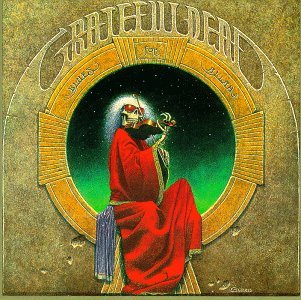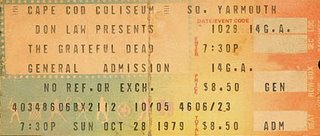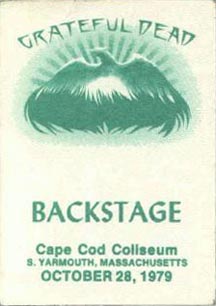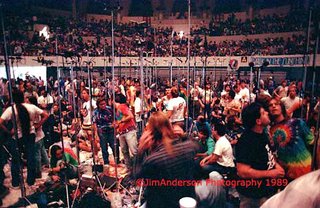BLUES FOR ALLAH

Notice I've only reviewed live albums so far. It really is mostly true about the Dead, their live stuff is way better. Garcia himself had a studio mantra: "God, we make shitty records." (cf. page 156, Rock Scully with David Dalton, Living With the Dead, Little, Brown, 1996.) Workingman's Dead and American Beauty aside, of course, and I could tell from reading around that Blues For Allah was considered some kind of subtle landmark as well. I figured I could get a used LP copy for two bucks almost anywhere, but it was a little harder than that; finally got one for $6.99 tonight at Chi's esteemed Laurie's Planet of Sound, and I'd have to say: definitely not bad at all. A very interesting LP, and I would say the 3rd-best Dead studio album. (What else challenges? Wake of the Flood, maybe?)
Starts out with a Dead classic, the Help/Slip/Frank medley. I've always loved these songs, and I've heard them well over a hundred times, but this is the first time it hasn't been from a concert, and compared to those booming soundboard versions this is amazingly calmed and sparse skeleton-funk, totally great. The low volume is perfect for Jerry's aching wise "Help on the Way" vocal, and when they go into the "Slipknot!" instrumental it's really too much, swing-jerk fusion-funk, laid-back but complex, soulful but tricky. "Franklin's Tower" still sounds out of place in the medley to me, and here it's only 4:37, but that laid-back studio style really works for it in a totally new way that is separate from the way it works as a 19-minute live version. The short studio version is a groovy little dance tune that got me and the wife movin' while we were cookin' dinner.
After that the LP really takes a post-"Slipknot!" plunge, getting even more fusiony & instrumental & best of all greasy. That same laid-back near-acoustic vibe works wonders here, making a jazz-rock fusion that I didn't know existed, possible only through relaxed home recording (the album was done in the studio that Bob Weir had just finished building over his garage). The only thing I can vaguely compare this instrumental music to is "Contusion" by Stevie Wonder, from Songs in the Key of Life, which was released just one year later in 1976. Call me crazy, I can't explain it. I guess Blow by Blow-era Jeff Beck could also be a comparison (yikes), but Blues for Allah not only has all that technicality, but a hell of a lot more soul. Side two closes with yet another sly turn, into the disco-Dead minor classic "The Music Never Stopped." This is a very loose and early version, and they improved it on stage, but on here it's still a major charmer, mainly because it's such a sweet vehicle for that skeleton-naked fusion funk studio-sound.
Side two seems pretty experimental, especially after the relatively straightforward opener "Crazy Fingers," which is an actual reggae tune, a mellow obtuse original that ends up working beautifully, a little less cloying than the band's more famous reggae standard "Fire on the Mountain." And that's really the last true song on the album -- it's followed by a "Sage & Spirit," a sweet Bob Weir guitar/flute/piano interlude-style instrumental, and then by the title cut, which is in fact a suite, totally prog. ("Blues For Allah"/"Sand Castles & Glass Camels"/"Unusual Occurrences In The Desert." Part of the reason they would divide long instrumental passages into different titles was for publishing. For example, here, the whole band gets a credit for "Sand Castles & Glass Camels." Same thing happened way back on Anthem of the Sun, with the original 'studio' version of "The Other One," divided into ridiculous subtitles like "Quadlibet for Tenderfeet" that were basically never used again, not once).
The "Blues for Allah" suite isn't something I can picture a lot of Deadheads dancing to, or even humming, just a lot of dissonance and long experimental instrumental passages, which is just fine with me. In fact, I am absolutely convinced that this side two suite directly inspired Sun City Girls to record the "Frankincense and Fish" suite that takes up most of side 2 of their Grotto of Miracles LP (1986). Both pieces open with a similar text and melody effect, a demented Greek Chorus effect that leads into a bunch of weird stuff in the middle. And what's in the middle of "Blues For Allah"? I'll just quote Mickey Hart: "[Garcia]'d be saying 'Allah'.... It's the envelope, and within the envelope is his voice, and delicate sounds like the paintbrushed glass, chimes, wood, and metal I was playing, and the crickets, which were slowed down three times and played backwards at half-speed, the sounds of the desert." From as quoted in Dennis McNally's A Long Strange Trip.




